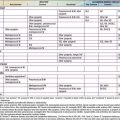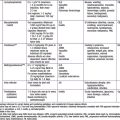Chapter 342 Treatment of Pancreatic Insufficiency
Baker SS, Borowitz D, Duffy D. Pancreatic enzyme therapy and clinical outcomes in cystic fibrosis. J Pediatr. 2005;146:189-193.
Borowitz D, Baker RD, Stallings V. Consensus report in nutrition for pediatric patients with cystic fibrosis. J Pediatr Gastroenterol Nutr. 2002;35:246-259.
Schall JI, Bentley T, Stallings V. Meal patterns, dietary fat intake and pancreatic enzyme use in preadolescent children with cystic fibrosis. J Pedatr Gastroenterol Nutr. 2006;43:651-659.




